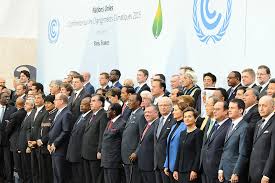The Paris Climate Agreement and Recent Developments
The Paris Climate Agreement is a self-imposing agreement wherein each country sets a specific target and date with the aim to mitigate global warming and greenhouse gas emission. The agreement, also known as Paris Climate Accord, was formed by the initiative of the United Nations Framework Convention on Climate Change (UNFCCC). The accord was finalised at the 21st Conference of the UNFCC in Paris which was attended by the representatives of 195 governments.
What was the major decision of Paris Climate Agreement?
One of the major decisions was to hold average increase in the global temperature well below 2 °C above pre-industrial levels by 2100. The general agreement was to reduce global greenhouse gas emission by 40-70% by 2050 and make the globe carbon neutral by 2100. To achieve the same, Paris climate accord targeted reducing usage of fossil fuel and encouraging usage of renewable energy. The tipping point was fixed to avoid serious impact on global food production and severe climate events like droughts and floods.
What is the importance of Paris Climate Accord?
Paris Climate Agreement consented by 195 countries on December 2, 2015 is the globe’s first comprehensive climate agreement. The consensus was reached after years of negotiations. It makes each country responsible to submit own plan to control climate change. Though not legally binding, each country undertook to implement its plans and put in a review process and improve scope of efforts every five years. The contribution of each nation towards the global reduction was termed "Nationally Determined Contributions" (NDCs). The agreement has no penal provisions for non-achievement of NDC and the implementation is through a “name and encourage” plan.
When did the Paris Climate Agreement come in force?
It was agreed that the agreement would come into force one month after it was formally accepted by at least 55 countries. This occurred on October 5, 2016 and The Paris Climate Agreement formally came into force on November 4, 2016. Almost all biggest emitters of greenhouse gas formally ratified the accord and some of them are the United States, India, China, Russia, Japan and European Union.
Can a country come out of the Paris Climate Accord?
Once ratified by a country, it is bound by the agreement for at least three years. After this, if a country decides to quit, it has to wait one more year.
What were the major criticisms against the Paris Climate Agreement?
The accord attracted criticisms mainly on two points.
1. It did not endorse carbon trading as a way of reducing carbon emissions.
2. It was previously committed by developed countries to jointly raise $100bn per year by 2020 to help developing countries to face climate change. The Paris Climate agreement failed in extracting any commitment towards this Green Climate Fund.
What is the latest development related to the Paris Climate Agreement?
US President Donald Trump as part of his election campaign had announced to withdraw from Paris accord if elected in the November 8, 2016 election. In tune with the election promise, he announced on June 1, 2017 that the US would withdraw from the Paris Climate Agreement to protect "America and its citizens". He also announced discontinuation of all US contributions to the Green Climate Fund. He cited the agreement as a disadvantageous one to the US, but indicated his readiness to work on something better.
The US has already ratified the Paris Climate agreement and hence it will take minimum four years to disassociate with the accord. Since the agreement is not legally binding, experts fear similar reactions from other developed countries too which could turn out to be a disaster in containing climate change.










